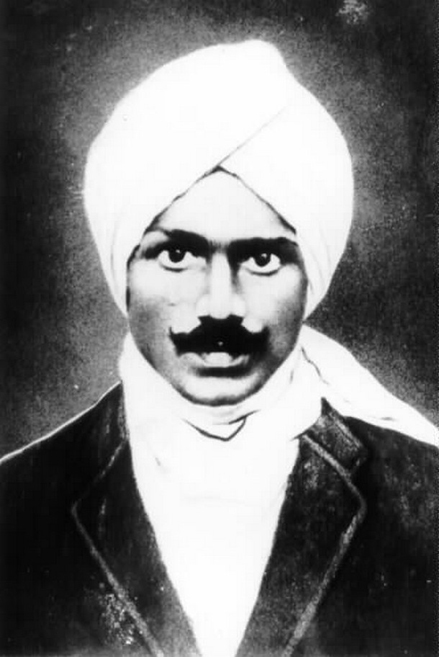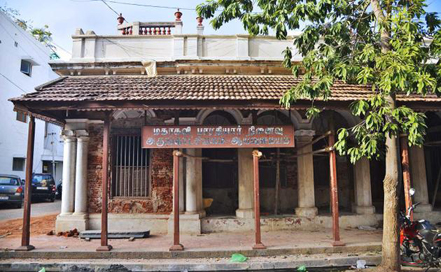|
Subramania Bharati is one of the great nationalist poets, social reformers, writers and revolutionaries of modern India. His works were mostly in Tamil, his mother tongue. Besides Tamil, he has also produced some wonderful poems and prose in English. Bharati was recognised as a Mahakavi, i.e. Great Poet, only several years after his death.
In this article I adopt a step-by-step chronological approach to unravel the special features in his life that enabled Bharati to emerge as a Mahakavi.

Subramania Bharati.
– J.B.P. More
Subramaniam Subbiah Iyer was born on December 11, 1882 in Ettayapuram, Tinnevelly District. He studied at the English School in Tinnevelly. Recognising Subbiah’s poetic talent, the vidwans of Ettayapuram conferred upon him the title ‘Bharati’ in 1893. The name stuck and he came to be known as Subramania Bharati.
After his marriage and his father’s death, Bharati was sent to Banares for his high school studies. Banares shaped him as a nationalist. He also read a lot of Western literature there. Of all the Western poets, Shelley captivated him the most. He did not just admire Shelley’s poetical genius, but also his ideas and fascination for the French Revolution and its slogan of ‘Liberté, Equalité and Fraternité’.
Not going on for higher studies, Bharati returned to Ettayapuram in 1902. In 1904, he published his first Tamil poem Thanimai Irakkam in the Tamil journal Vivekabhanu in Madurai, edited by Pulavar Kandasamy Kavirayar. Later that year he joined the Swadesamitran in Madras as a sub-editor. In the newspaper he was at a vantage point to reflect upon the various happenings in the country and the world. He repeatedly expressed his love for his mother country through poems and essays, which attracted a wide cross-section of the Tamil-reading public. Vangamai Vazhiyavay was his first nationalist poem. In 1907-08, 16 of his poems were published under the title, Swadesa Gitangal.
Due to differences of opinion with G. Subramania Iyer, Bharati quit Swadesamitran in 1906 and joined a journal called India, that was just starting, as its undeclared editor. Bharati now had free rein to become a radical nationalist writer and poet. But hearing that he might be arrested Bharati fled to French Pondicherry in September 1908.

Bharati's house in Pondicherry.
In Pondicherry Bharati familarised himself with French culture and civilisation. He learnt the French language. He read the works produced by French revolutionary thinkers and writers, poets and philosophers like Voltaire, Victor Hugo, Diderot, Jean Jacques Rousseau, Montesquieu and Proudhon. He then restarted India in Pondicherry, with Liberté, Equalité, Fraternité as the motto that appeared in its masthead. He became fascinated with France and its values which shaped his thought and writings in Pondicherry. He considered the French nation as the mother of freedom and representative democracy.
After Bharati came to Pondicherry, in continuation of Swadesa Gitangal, a second compilation titled Janma Bhoomi was published in 1909. It contained 17 poems. The very next year a third volume of 15 songs, titled Matha Vasagam, saw the light. These songs were essentially autobiographical and patriotic in nature. In the same year Bharati’s philosophical story titled Gnanaratham (Chariot of Knowledge) was published.
Bharati had to wind up his journalistic pursuits in 1911 for various reasons. It was at this stage that Bharati opened a new page in his life. Instead of taking entirely to religion and spirituality, like Aurobindo, his attention turned more towards social reform and literature.
In a short story titled ‘Aaril Oru Pangu’ (One-sixth), written in Pondicherry in 1910, Bharati charged the Hindus with ill-treating the depressed castes, who formed one-sixth of the total Hindu population, and relegating them to downtrodden conditions for a long time. He stated that what the Hindus had done to the Pallars and the Parayars was being done to them (the Hindus/Indians) by the British.
In 1912, another of Bharati’s masterpieces, Panchali Sabatham, saw the light. Its first part was published in 1912, while the second part was released after Bharati’s death. Bharati modified a part of the Hindu epic Mahabharata for this work. It demonstrated the slave-like condition of India and compared the shameful undressing of Draupadi to the despoiling of Bharatha Mata or Mother India of his day by the British. He accused India’s politicians and religious leaders of quarrelling and fighting with one another, instead of trying to save Mother India from the clutches of the Whites.
Though the prime objective of Panchali Sabatham was to seek the liberation of Mother India, it had other objectives too. One of them was the development of the Tamils and the Tamil language. This becomes quite apparent through his Preface. He says in it that those who write in ordinary Tamil, with a simple style, which the people can appreciate, will give new life to the Tamil language. He, however, admitted that the task was immense and that his talents were limited and so he wrote in order that others might follow his guidance. He also affirmed that it was Parashakti herself who had inspired him to work for rejuvenating the Tamil race. He wanted to implement Tamil everywhere and in everything. He criticised the South Indian political leaders of his time, who shunned speaking in Tamil. He declared that only foolish people believed that Tamil would die and all Indian languages would be replaced by English. He was in favour of Tamil as the medium of instruction in schools and colleges. He once wrote, “If the effulgence of Tamil does not spread in the whole world, change my name.”
Yet, he was fluent in English and Sanskrit. Even before 1910, he had translated from Sanskrit parts of the Vedas and Upanishads and the Yoga Sutras of Patanjali into Tamil. All this shows that Bharati was extremely well versed in Sanskrit too. He never stood for the purification of Tamil as attempted by Maraimalai Adigal; he was for the enrichment of Tamil through Sanskrit.
* This article is based on J.R.P. More’s book Puducheri Valartha Bharathiar, published by Leon Prouchandy Memorial Sangam, Pondicherry, in 2011.
(To be concluded)
|

